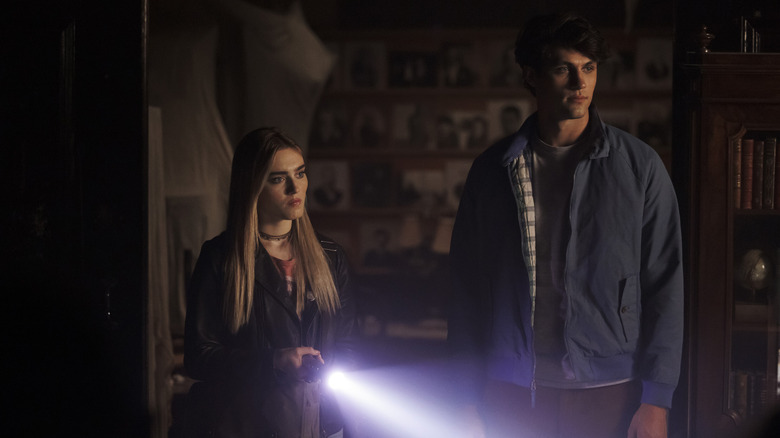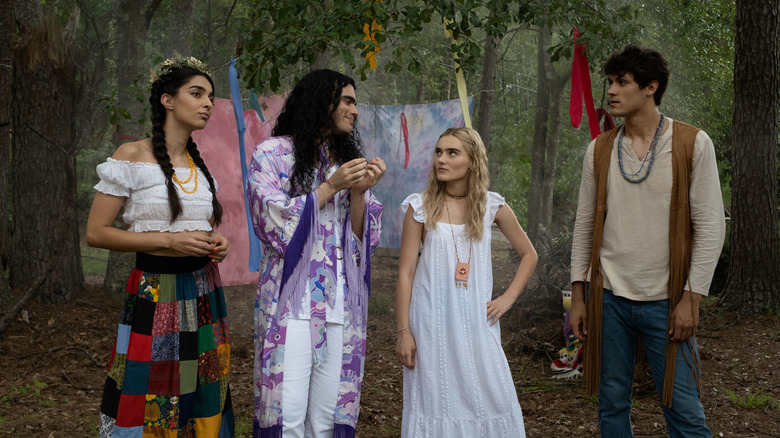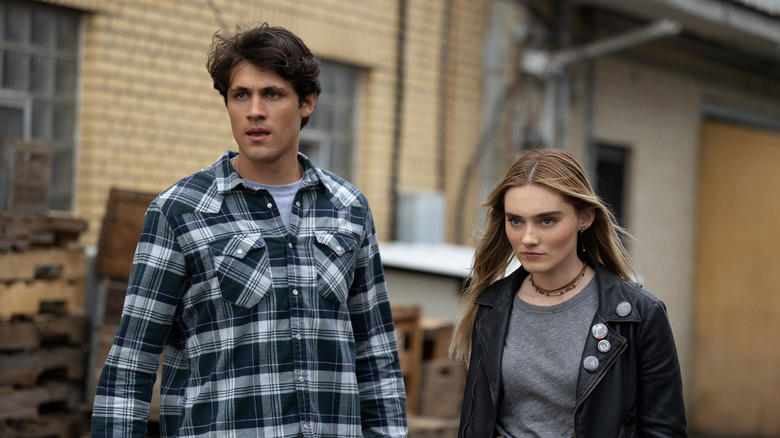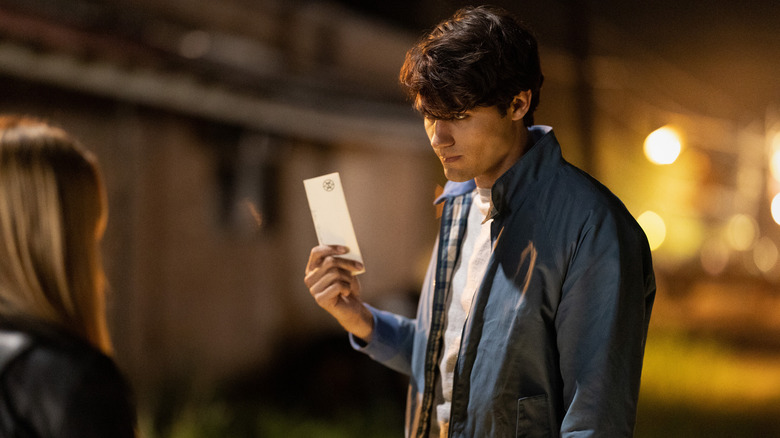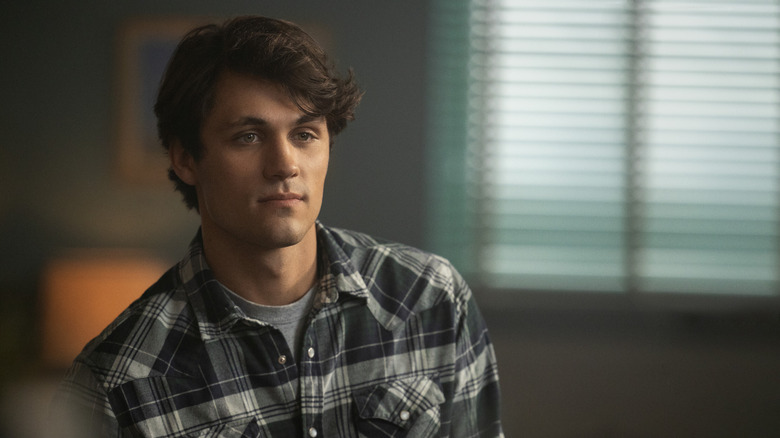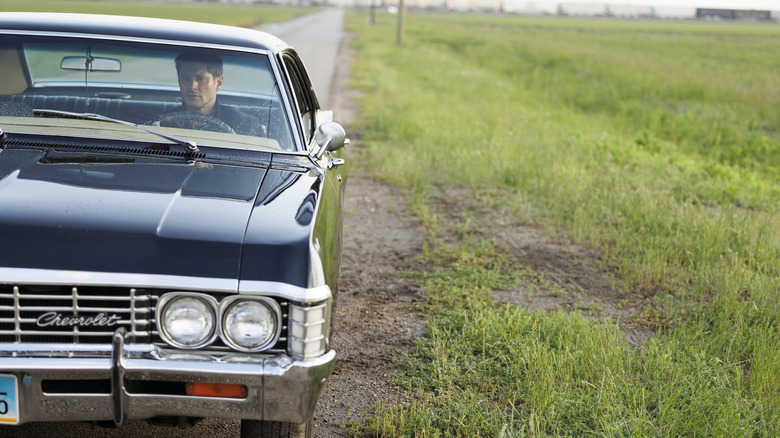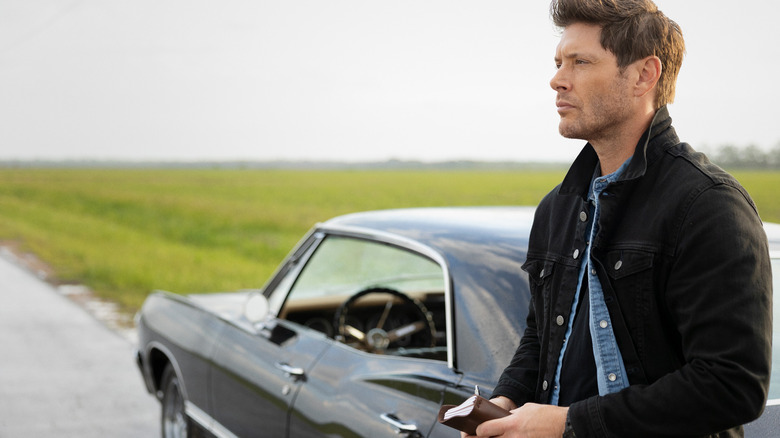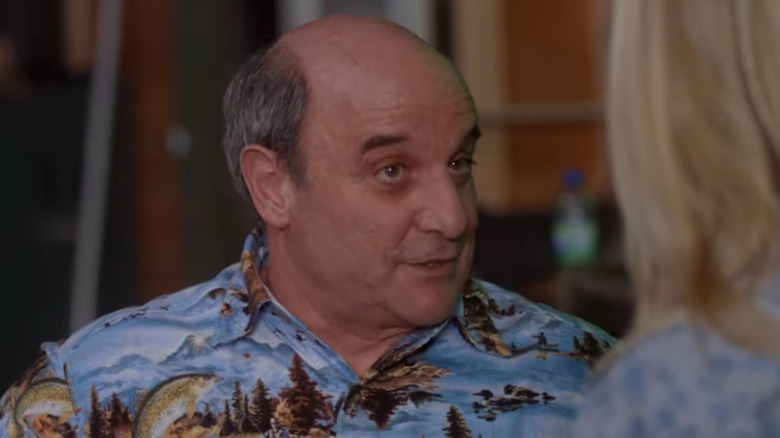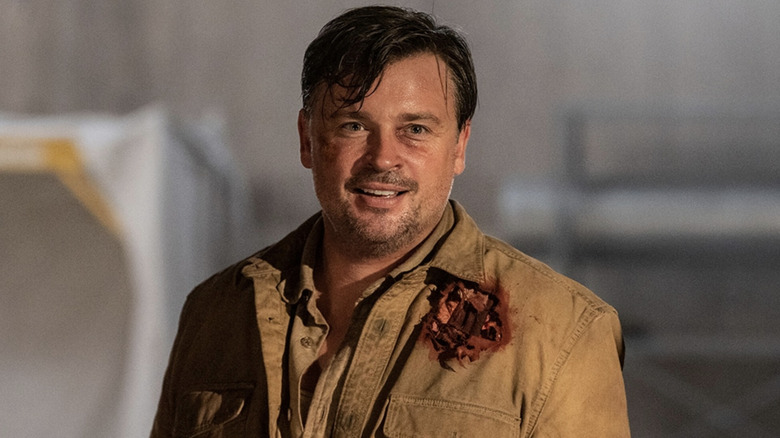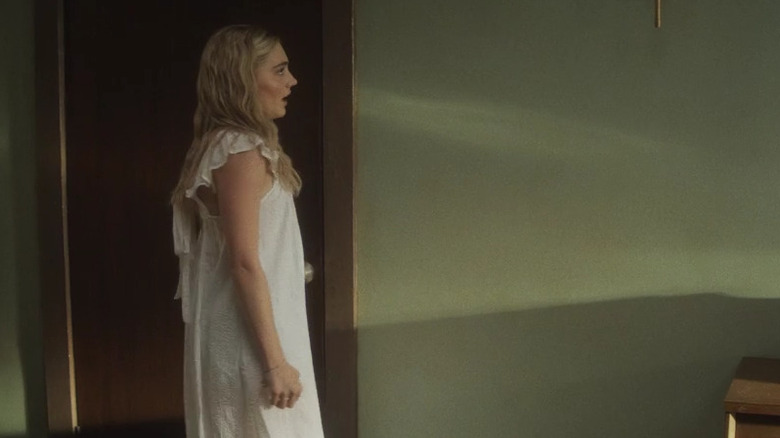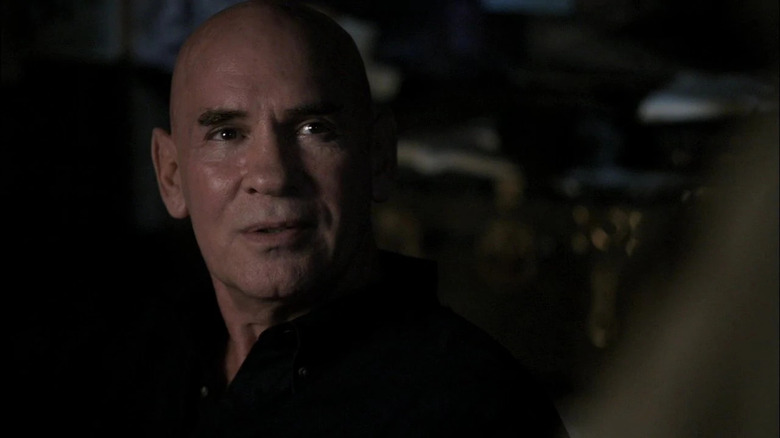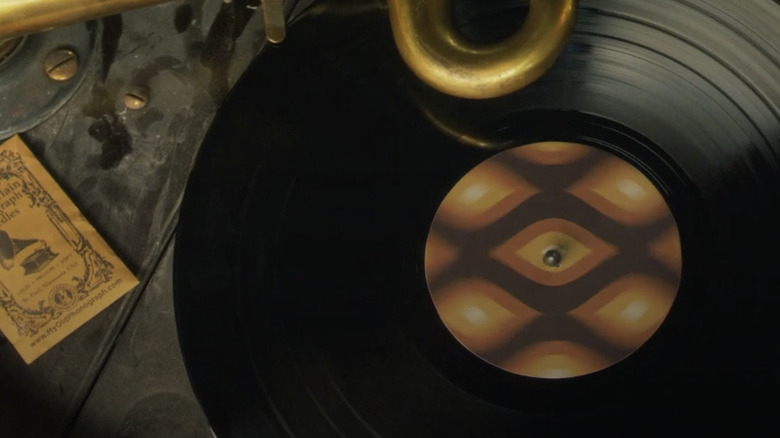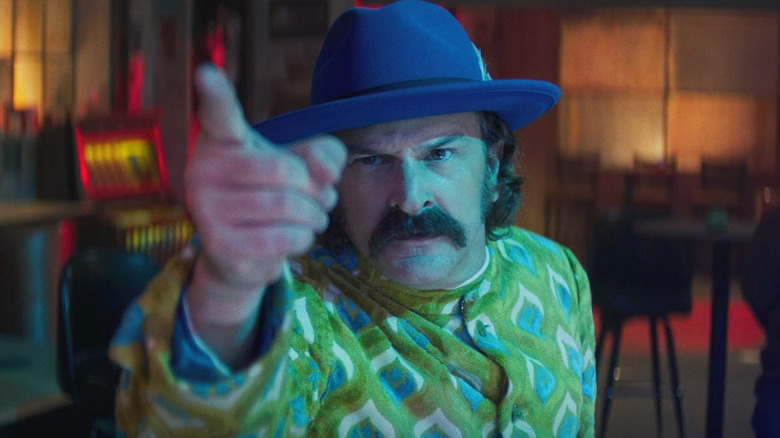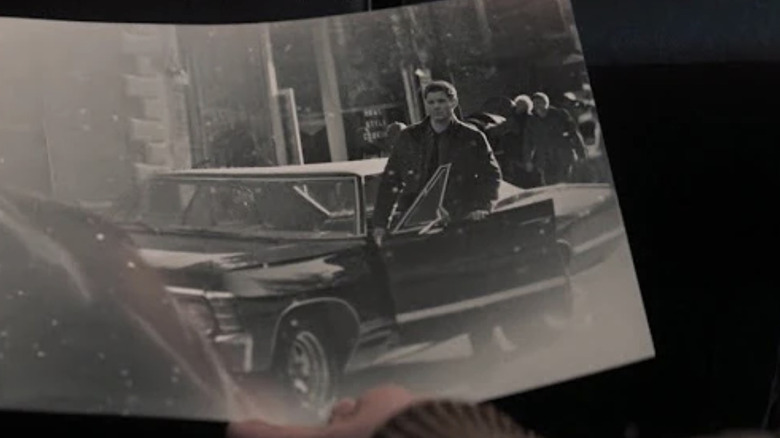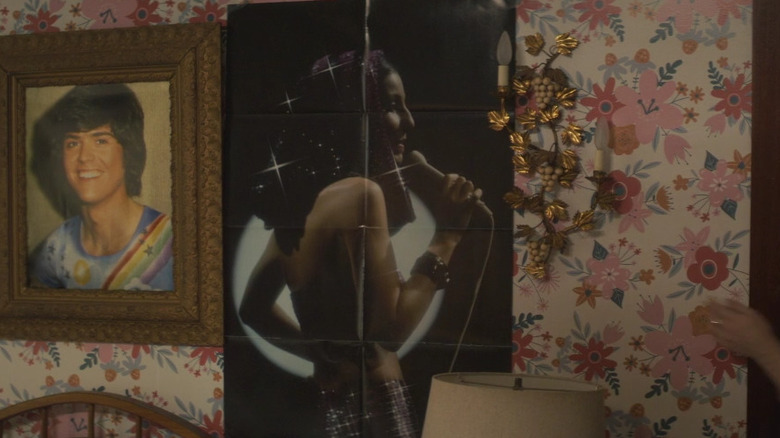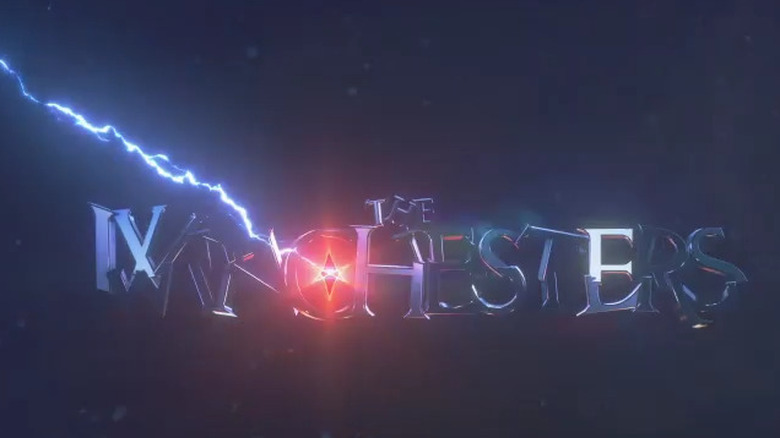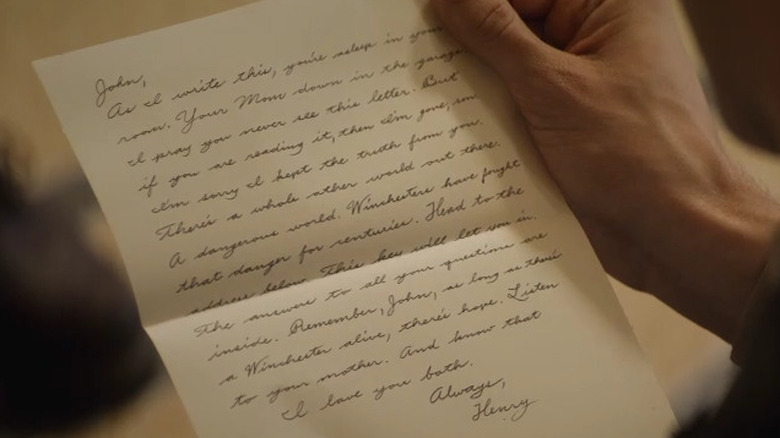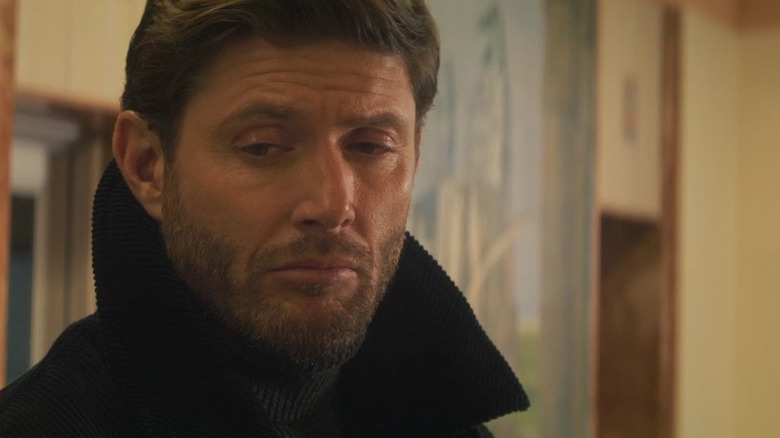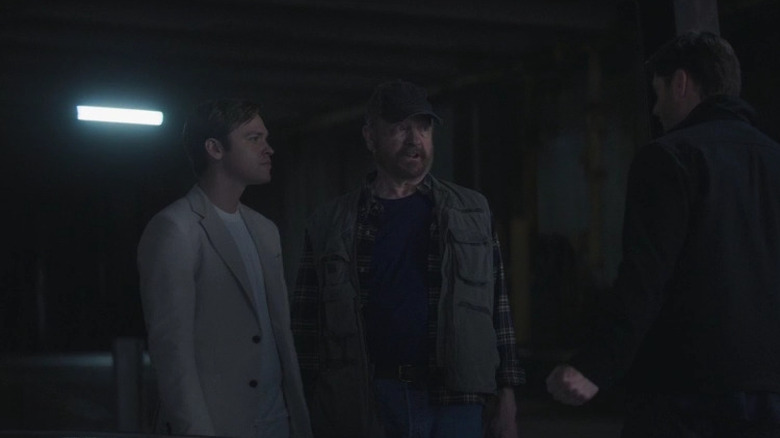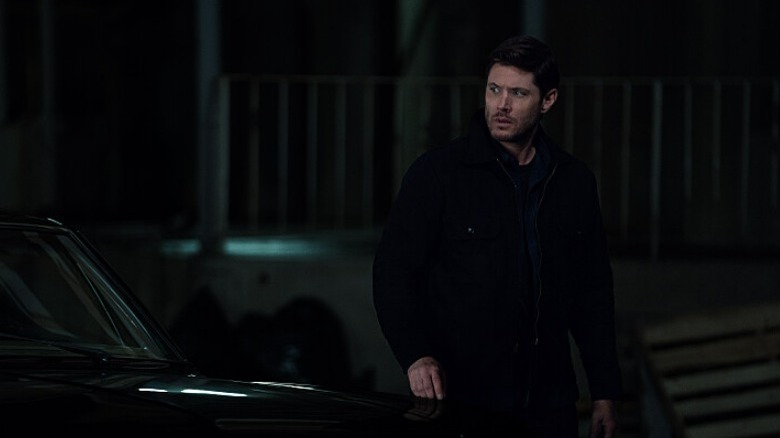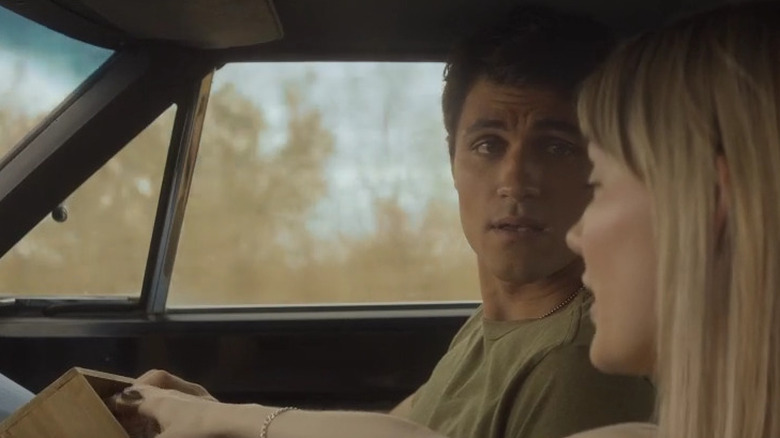Small Details You Missed In The Winchesters
"Supernatural" gave fans 15 seasons of rich folklore, symbology, music, and nerdy references to explore throughout the series. With such rich and expansive mythology to pull from, it's no surprise that fans keep finding new and exciting details about the series. Dean and Sam Winchester spend their time on "Supernatural" killing monsters and taking names, all against a classic rock soundtrack. Though the ending of "Supernatural" has come and gone, Jensen and Danneel Ackles brought this beloved world back to fans in the form of a spinoff called "The Winchesters."
While the original series teases the love story between Dean and Sam's parents, John and Mary Winchester, fans witness Heaven and Hell tamper with the family more times than they can count. In both parental time-travel episodes, demons and angels alike meddle with Mary and John. Considering all the upheaval, it's not exactly a stretch to think that the version of their parents' origin story Dean and Sam think they know might not exactly be accurate, and Dean is determined to discover the truth.
Of course, in chronicling this story, "The Winchesters" creatives can add a slew of references to the original series, its actors, and the show's expansive musical choices. Between Easter eggs, plotline teases, symbology, and dialogue references, here are some small details you may not have noticed in "The Winchesters."
I'll see you around, Soldier Boy
The series wouldn't be a "Supernatural" spinoff if it didn't poke fun at the actors' other roles. Fans might remember the gory Valentine's Day episode of "Supernatural" titled "My Bloody Valentine." While the show frequently took its titles from Led Zeppelin songs and classic films, Jensen Ackles played the villain in the remake of the horror film by the same name, inspiring the episode title.
"The Winchesters" is taking a page out of its parent show's book by poking fun at yet another one of Ackles' roles — this time, from "The Boys." The Eric Kripke-led show is arguably the most delightfully unhinged thing on TV, and Ackles joined the series in Season 3 as the villain Soldier Boy. It's not difficult to see where Mary's nickname for John found its inspiration. Mary tells John, "I'll see you around, Soldier Boy," when she first meets him, and it becomes a theme later on.
The OG anti-possession charm
As far as Easter eggs on "The Winchesters" go, the anti-possession charms are an intriguing addition to canonical lore. When Dean and Sam get matching anti-possession tattoos in Season 3 of "Supernatural," some fans thought the sun design was an artistic choice. It's the pentacle that matters, right? Yet in the "Pilot" episode of "The Winchesters," both Mary and John have the same sun pentacle sigil on separate charms to prevent possession.
Now, this is the case before the duo really knows each other. Mary's charm undoubtedly comes from her hunter family, while John's is a relic from his dad's Men of Letters days. So, how do two unrelated brands of hunter families have the same charms that their future sons will later get tattooed on themselves? Sure, it's possible that the writers just wanted to throw in a fun Easter egg, but it begs the question: Would a barren pentacle not prevent possession? It's certainly not a do-or-die conundrum, but it's still fun to speculate.
Ground control to Major Tom
As it turns out, Mary may have been a larger musical inspiration to Dean than John. We know she sang "Hey Jude" to him in lieu of a lullaby, but her musical influence might go even further. In the "Pilot" of "The Winchesters," John is having war flashbacks when Mary says "Ground control to Major Tom" to get his attention. David Bowie fans may have clocked the classic rock reference to the song "Space Oddity," but the reference goes even deeper into "Supernatural" canon.
In the Season 6 episode "Clap Your Hands If You Believe," Dean absurdly fights a fairy while that very same song plays in the background. It's one of the more ridiculous sequences in the series, but it's also one of the most memorable ones. The subtle Easter eggs to the OG show are certainly fun, but most fans are just happy that "The Winchesters" takes its musical cues as seriously as its parent show ... even though, in this case, the parent show is about the children.
The family business
Apparently, John Winchester was saving people and hunting things before it became the family business. Who knew? While fans spent the first seasons of "Supernatural" thinking John only gets into the hunting game after Mary dies, Season 5 already retconned that notion.
Season 4's time-travel episode, "In the Beginning," hinges on Hell meddling with the Campbells and Winchesters with John's premature death and Mary's demonic deal with Azazel. Yet in Season 5's "The Song Remains the Same," Heaven is responsible for all of the tampering. After a gut-wrenching exchange with Sam where John unknowingly flames his own future parental choices, John says yes to Michael using his body to save Mary. Luckily, Michael only wants to chat with Dean, and he scrubs John and Mary's memories instead of doing lasting damage — if it's even possible for Michael to meddle with the past enough to change the future. Through it all, we discover that John did know about the supernatural world at one point, and the angels made him forget. In fact, the entirety of "Supernatural" hinges on both Heaven and Hell screwing with this family.
In the "Pilot" of "The Winchesters," John mirrors Dean's own family business sentiment from the "Pilot" of "Supernatural." John says to his mom, "Saving people, hunting things. I was born to do this." Well, he's right — because no matter how many times higher powers make him forget, John Winchester always finds his way back to the life.
Sigil of Azazel
The show's many sigils virtually make up a main character on "Supernatural." Throughout the series, we see symbols and sigils like the Devil's Trap and Men of Letters symbols — both of which appear prominently in the premiere of "The Winchesters." Fans may not have expected the Men of Letters bunker to show up in the prequel, but John and Mary uncover it in the show's very first episode. Even more curious, however, is what Mary discovers in a filing cabinet.
During her quest to find her father, a notion "Supernatural" fans are familiar with, Mary is instructed to uncover a particular file in the bunker. And while the Men of Letters symbol on the page isn't new, another sigil — The sigil of Azazel — might ring some alarm bells. John uses this symbol in "Supernatural" Season 2 to summon and make a deal with the Yellow-Eyed Demon to save Dean's life. Interestingly enough, the sigil looks an awful lot like the Norse Inguz rune which often represents fertility. That's an intriguing connection, given Azazel's proclivity toward amassing a child army to raise Lucifer from Hell. Additionally, two of the other present symbols look a lot like the Raido rune (representing a journey — either physical or spiritual) and the Othala, aka the Othilla rune (which symbolizes family and ancestry).
The combination of these rune meanings hints at a much larger picture that might explain how Mary and John come to forget this part of their history. Given the Raido rune's association with space and time, and the fact that they uncovered this in the Men of Letters bunker, it just might have something to do with Henry Winchester's time-travel expedition.
Sadly, like many symbols throughout history, hate groups have appropriated Norse ruins and symbols like the Othala rune have been co-opted and manipulated by white supremacists and Nazis. With that in mind, some might argue it would have been a good idea to use a different set of symbols for the show's mythology, given the modern associations of the runes.
Baby is back
For the first few seasons of "Supernatural," Dean Winchester wouldn't be caught dead without the amulet Sam gave him when their dad bailed on Christmas. In Season 5, the brothers discover that the amulet, nicknamed by the fandom as the Samulet, is a GPS (or maybe we should say "CPS" with a "C" that stands for "cosmic?") charm for God that burns hot in his presence. Of course, God is God, and if he doesn't feel like allowing a talisman to work, he can suck the magic right out of it. At this point, Chuck isn't ready to show his true colors, and Dean throws the amulet in the trash after losing what little faith he has left.
Yet that's not the last we see of the Samulet on "Supernatural." Robbie Thompson wrote the episode "Fan Fiction," where a fan of the in-universe book series written by Chuck calls Dean out for throwing the amulet away. Despite telling her, "I don't need a symbol to remind me how I feel about my brother," Dean hangs the fake amulet up in the Impala for that single episode. However, it shows up one last time in another Robbie Thompson episode, "Don't Call Me Shurley," God turns the amulet's juice back on, and the Winchesters learn the truth about Chuck's secret godly identity. It's probably a good thing Sam keeps the amulet all that time.
In the "Pilot" episode of "The Winchesters," the amulet once again hangs from the Impala's mirror. And what do these three integral episodes all have in common? You guessed it: Robbie Thompson. Astute fans might also notice the Winchesters' cooler in the back seat and Baby's original KAZ-2Y5 license plate.
I'll keep picking the music
If Dean's heavenly journey to discover his parents' real story wasn't enough of a tearjerker for fans, his closing remark should make even the most hardened fan misty-eyed. Dean's love of classic rock is notorious on "Supernatural," with his array of classic rock tapes providing the backtrack for the show. Between Dean's "Smoke on the Water" ringtone and "Carry on Wayward Son" becoming the show's anthem, music is as much of the heartbeat of "Supernatural" as the Winchester brothers themselves.
In the "Pilot" of "The Winchesters," the song "I'd Love to Change the World" by Ten Years After both opens and closes the episode. Looper learned in a press junket for the series that executive producer Danneel Ackles picked the song, but in the show's canon, it's actually Dean's idea. After a somber monologue about searching for answers about his parents, Dean says, "I'll keep pickin' the music."
The heartwarming "Pilot" moment is a nod to what is arguably Dean Winchester's best one-liner ever. In the "Pilot" of "Supernatural," Dean tells a miffed Sam that the "Driver picks the music, shotgun shuts his cakehole." This small reference promises fans that "The Winchesters" will embody everything the original stood for — both in heart and musical cues. Though while "Supernatural" is based long after the classic rock era, "The Winchesters" has a tougher job of sticking to the show's timeline and not playing songs that came after the show takes place. But with Dean in charge, we're not worried.
In memoriam
Fans who don't stick around for the credits may have missed Lou Bollo's "In Memoriam" honor after the title card. Bollo's name should sound familiar to anyone who watched the "Supernatural" episode "The French Mistake" more than a few times. Bollo was the stunt coordinator on "Supernatural" from the early Season 1 episode "Wendigo" up until the Season 12 episode "All Along the Watchtower." That's 252 episodes for inquiring minds. TV crew members don't always get their props, but "Supernatural" actors and the show itself have always made it a point to showcase the off-screen creatives who make the show what it is.
Bollo's work was integral to every fight scene "Supernatural" had seen during his tenure, and the meta episode "The French Mistake" put the stunt coordinator in the spotlight. Of course, the episode finds Dean and Sam acting in their own fictionalized version of the show, so it was only natural to shine a light on the real creatives behind the series.
While Micah Hauptman played creator Eric Kripke and Philip Maurice Hayes took on the role of Ackles' and Padalecki's bodyguard Clif Kosterman, Bollo played himself in this goofy love letter to the industry. It's good to see "The Winchesters" acknowledge and honor the work of creatives like Bollo, without whom this world wouldn't have been possible.
Like father like son in law
As much as Dean and Samuel butt heads when Dean goes back in time during the original series, they're more alike than different — especially when John becomes a hunter. Though the season finale reveals that "The Winchesters" exists in an alternate universe, this universe's Samuel has plenty in common with OG hunter John, too. In the "Supernatural" pilot, John leaves Dean and Sam a motel room filled with newspaper clippings and his beloved hunter's journal.
While the patriarch of the Winchester family doesn't want his sons to find him at this point in the story, he guides their future hunts with coordinates, which vaguely lead them to where he wants them to go. In an aptly titled episode of "The Winchesters" called "Teach Your Children Well," Samuel mirrors John's shady behavior by leaving Mary a newspaper clipping that guides his daughter and her merry band of hunters to their next case. Like the original John, he's not giving her the full story while vaguely ushering her to a Big Bad without all of the information.
The clipping takes them to a cult-like gathering that gets them one step closer to figuring out the Akrida's agenda with the "unicorn" monsters. Later on, Samuel expresses that he wanted to keep Mary safe from this particular Big Bad — even though he knowingly sent her into danger without giving her the complete picture. Calling all hunter dads: Please do better.
White dress or doomed future?
Not much changes with Mary's fashion choices in the decade between "The Winchesters" and her death in the pilot of "Supernatural." Yet one outfit the young hunter wears in "Teach Your Children Well" chillingly foreshadows Mary's possible future. The first five minutes of the "Supernatural" pilot establishes the series' propensity for death within the Winchester clan and around it. Long before we learn the lore surrounding Mary's death (and her deal with the Yellow-Eyed-Demon Azazel), we watch Sam and Dean's mother meet a crispy end as she's ripped onto the ceiling and burned alive.
Naturally, that would make any family a little jaded, but as the seasons go by we start to uncover what really happened that fateful night. It turns out that Mary made a deal with Azazel to save John, and 10 years later he stopped by the Winchester house to claim his reward — Mary just got in the way. It's impossible to think of the "Supernatural" opener without recalling Mary's white nightgown, which symbolizes purity. Both the Winchester brothers and their father, John, put Mary on a pedestal. To them, she can do no wrong, and her attire mirrors that.
In "Teach Your Children Well," Mary wears a white dress strikingly similar to her nightgown from the "Supernatural" pilot. The callback is a grim reminder of what Mary's fate might end up being, although the Season 1 finale posits that this Mary lives in an alternate universe from the original Mary. In some ways, this could give fans hope that Mary may evade her fate. However, despite Dean's meddling in the past, the Winchester matriarch has ignored his warnings before.
Samuel's rough years
Okay, we're just gonna say it — what the heck happened to Samuel Campbell between 1972 and 1974? There's no denying that Mitch Pileggi is a dapper guy and a great guest star on "Supernatural," but it's hard to believe Tom Welling's iteration of John became Pileggi's in just two years. Sure, it is a different universe, and even John and Mary look relatively different than the actors who played their young counterparts (Matt Cohen and Amy Gumenick) in the time-travel episode of "Supernatural" Season 4, "In The Beginning." Yet nothing really explains the profound change in Samuel's appearance between the two shows.
That being said, hunting is pretty rough on the body, so it's not entirely without merit that Samuel would lose all of his hair and seemingly age 10 years in the span of two. Maybe a witch put a curse on him. Still, it just doesn't add up when you think about the timetables between the flashback episodes and the prequel series.
"The Winchesters" producer Danneel Ackles confirmed on Instagram that the prequel series takes place in 1972, and as a result, the math just isn't mathing. Of course, it's a bit of a petty grievance that doesn't matter much in the grand scheme of things, but we're getting some major Ewan McGregor Obi-Wan Kenobi vibes between the "Star Wars" prequels, the self-titled show, and a really rough couple of years before McGregor becomes Alec Guinness.
Can't find my way home
The great thing about "The Winchesters" is that it takes place when many of the original show's best musical moments were actually released. Given that plenty of the best music choices in "Supernatural" debuted before the mid-'70s, the prequel can call back to some of these songs. This happens in the episode "Reflections" when the Blind Faith song "Can't Find My Way Home" plays.
"Supernatural" fans who pay attention to the show's vast music catalog might recognize two moments from the series that also feature the song. Streaming rights made Netflix change the goodbye moment between Dean and Cassie in "Route 666" from "Can't Find My Way Home" to the 2005 song "Line of Love" by The Minors. However, fans who watched live or rely on the DVDs to rewatch the show better understand the show's classic rock tunes — and recoil at even minor changes.
Thankfully, the series brought back the Blind Faith song in the Season 9 finale, "Do You Believe in Miracles?" with an even more iconic sequence. The ballad accompanies Metatron stabbing Dean with an angel blade, Dean telling Sam he's proud of the brothers, the revelation that Castiel will die if his grace isn't replenished, and Sam's attempts to summon Crowley. The song cuts off right before Crowley's deathbed chat with Dean and the eldest Winchester's demonic reveal.
"The Winchesters" takes a bit more of an on-the-nose approach to the song, as it plays on a record that looks an awful lot like a gaudy motel room pattern you might see in the original show. Here, the song represents Henry and Samuel's inability to come home to their sons.
The Knave of Hearts
If the nightclub in "Hang on to Your Life" sounds familiar, you're probably an "Alice in Wonderland" fan — or you know your playing card history. Before we called the aristocratic-looking card a Jack, he was typically referred to as a knave. Additionally, in "Alice in Wonderland," the character known as the Knave of Hearts faces a trial for stealing the queen's tarts. The trial is relatively absurd, and a significant component tackles justice and an unfair trial. With that backstory in mind, it makes perfect sense for Carlos' showdown with Loki to occur in a club with this name.
Loki essentially traps his victims in a battle they seemingly can't win. They can either choose to kill someone in a fiery blaze or die themselves. For what? Some good musical performances. Yet Carlos decides not to play Loki's twisted game. Despite getting sold out by his former bandmate, Carlos chooses to die before letting someone else get hurt — even if they've brought their fate onto themselves. However, it turns out that this is precisely how to trap Loki.
After generations of Loki pulling this trick, Carlos is perhaps the only one to sacrifice himself. That, in turn, traps Loki in his own mirror — which in itself displays a superficiality, just like the queen. And like the Knave of Hearts, justice wins, and a corrupt source of power is taken down by a "commoner."
Dean Winchester is a babe
What is with TV shows making random, subtle comments with incest vibes? "Supernatural" first went there with the Season 4 time travel episode "In the Beginning," when Dean makes a pretty creepy offhand comment about the young version of his mother. He says, "Sammy, wherever you are ... Mom is a babe! I'm going to hell. Again." While the line is almost funny (and weirdly on brand for Dean), it's more creepy than quirky. Out of all of Dean Winchester's best one-liners in "Supernatural," we can happily leave this one on the side of the road.
Yet apparently not. "The Winchesters" makes an unfortunate callback to this repressed moment when Mary sees a picture of Dean. In her defense, she doesn't actually know that Dean is her child (unlike Dean). So her offhand comment about Dean is a bit more forgivable. When Mary sees her alternate universe son's photo, she says, "He's not a bad-looking one either." It's still less cringe than saying, "Mom is a babe," but it's equally unnecessary and awkward. Can we just collectively put the kibosh on lines that imply creepy feelings between family members?
You've got a friend
Carole King's "You've Got a Friend" may have inspired the title of Episode 11 of "The Winchesters," but she's not the only iconic female performer to impact the episode. In the episode named after King's 1971 song, fans get a more significant glimpse at the Winchester house. Latika and Carlos are tasked with raiding the room of Mary and Latika's dead friend Maggie for a truth bracelet. Though the duo is unsuccessful at procuring the bracelet from Maggie's room, we get a bit of a post-mortem look at her personality and style. Adorned on the wall of the late hunter's floral wallpaper is a poster of Cher performing during "The Sonny & Cher Comedy Hour."
Interestingly enough, this isn't the first reference to the once-iconic couple in the universe. When Dean meets the young version of his father in the time travel "Supernatural" episode "In the Beginning," he roasts the waiter for his glasses, joking, "You know, Sonny and Cher broke up." John is surprised (given that it's still 1974) and the moment is the lynchpin for Dean realizing that he's actually in the past.
Light up the title card
One of the more innocuously fun moments of "Supernatural" comes from the show playing with the title cards over the years. Each season has a different thematic vibe for the title cards — between the ghostly intro in Season 1, the Key of Solomon and demon essence in Season 3, and a fiery Men of Letters symbol in Season 12. Though each season has its own card, certain thematic episodes get their own quirky title card. The first instance of this doesn't happen until the Season 3 episode, "A Very Supernatural Christmas," where we get a shattered Christmas ornament and a snowy background.
As the series began showcasing more light thematic episodes, we got book illustration title cards, an homage to "The X-Files," glittery clown guts, a wedding cake, and a frontier map, to name a few. "The Winchesters" follows this formula for the season finale, where the series teases what's to come in the episode.
The original title card for the prequel mirrors the "Supernatural" Season 1 choice in simplicity and vibe. However, "The Winchesters" title card has a red coloring choice with a Men of Letters symbol in the "C" and red flashes of the symbol as the title moves. In the season finale, the title card pays homage to the "Supernatural" Season 1 card with blueish hues. Additionally, the "C" gets hit with lightning, teasing Dean Winchester's flashy return to the show. Given the alternate universe revelation in this episode, the title card is symbolic of the "Supernatural" and "The Winchester" worlds (and characters) colliding.
Always, Henry
If there is one thing fans can expect from a show in the "Supernatural" universe, it's daddy issues. Hunters (and Men of Letters) typically don't have a cheery childhood with a present father, and nearly every character on either show has some kind of paternal trauma. Mary searches for her missing father in "The Winchesters," while John sets out to figure out why his father left. Neither father is perfect, but that's par for the course when someone spends their life hunting monsters. In fact, the "Supernatural" version of a grown-up John isn't winning any parenting awards, either.
Interestingly, the finale offers another perspective on John and Henry's relationship, revealing that Henry signed a goodbye letter to his son as Henry and not Dad. In a flashback scene, Dean delivers the letter to his own alternate universe father right after John gets home from the war. It's a combination of cryptic, loving, and detached — which sadly seems to be the Winchester fatherly way.
If you pause the scene and look closely, fans can actually make out the entire letter, which reads: "John, as I write this, you're asleep in your room. Your mom's down in the garage. I pray you never see this letter. But if you are reading it, then I'm gone, and I'm sorry I kept the truth from you. There's a whole other world out there. A dangerous world. Winchesters have fought that danger for centuries. Head to the address below. This key will let you in. The answers to all your questions are inside. Remember, John, as long as there's a Winchester alive, there's hope. Listen to your mother. And know that I love you both. Always, Henry."
Pretty savage to leave your kid and not sign a letter with Dad.
The man with no name
If there's one thing Dean Winchester can appreciate, it's a good Western reference. Dean's presence is sprinkled throughout "The Winchesters" — both with narration and fleeting implications that he is in John and Mary's world pulling some strings. Somehow, despite being dead, Dean's existence on "The Winchesters" is corporeal enough for him to show up normally on film. He can also engage with this world in a non-ghostly manner. Maybe he picked up a thing or two in heaven?
Given that Mary and John have no clue that Dean is their alternate universe son, they simply call him the Man With No Name. The first film in Clint Eastwood's "Dollars Trilogy" was released in 1964, so it looks like Dean isn't the only Winchester with a soft spot for Westerns. Dean would no doubt be thrilled to know that his parents likened him to Eastwood's character, the Man With No Name.
Though Dean would love the nickname, he wasn't actually trying to serve Western looks. It turns out that Dean Winchester is kind of a fashion icon when he's on a heaven budget rather than a hunter budget. An Entertainment Weekly interview with Jensen Ackles lent insight into Dean's updated peacoat look and beard, which primarily exists because Ackles had to film another project. To tie the look together, Ackles proposed that Dean should go for a Navy look to fit in with John's military vibe and avoid sticking out.
There'll be peace when you are done
You're bound to elicit tears if you play Kansas' "Carry on Wayward Son" within five miles of a "Supernatural" fan. The song first played on the show in Season 1's penultimate episode, later becoming a season finale staple. In addition to marking the end of each season, the song appears in the musical episode (and the show's 200th episode) "Fan Fiction." "Supernatural" fans and musical group Neoni also did a gorgeous acoustic version of the song that accompanies Dean on the road to heaven while Sam lives out his life on Earth.
Naturally, the song had to appear in "The Winchesters" in some capacity, and the new series goes the reference route to set the prequel apart from its parent show. While we don't get to hear the song play, Jack, of all people (or gods), is the one to reference this melodic piece of "Supernatural" lore.
Though he's adamant that dead hunters and supreme beings alike must stay out of human affairs, he allows Dean to have his last hunt to give his alternate universe parents a chance to stop a significant threat from wiping out humanity. Since Mary and John live in the '70s, we'll just try to ignore time travel logistics for a danger that should have already happened. Regardless, Jack wants Dean to rest. He gives Dean the opportunity to shut his final case but instructs, "After this, it's time to get around to the 'There'll be peace when you are done' part of the song." Looks like Dean taught his surrogate son a thing or two about music in heaven.
The origins of James Hetfield
If Mary and John live long enough to reach 1981, they're in for a fun surprise. The newly-minted hunting duo (and couple) are more than familiar with using aliases on the job. As it turns out, it's not John who kicks off this classic Winchester family tradition, but Mary. In Episode 2 of "The Winchesters," Mary chooses Mick Fleetwood for John and Christine McVie for herself. Of course, both are members of Fleetwood Mac — although Mary definitely isn't winning any awards for subtlety, especially using both names at once.
At the end of "The Winchesters" finale, titled, "Hey, That's No Way to Say Goodbye," Dean is a bit evasive about his own identity. We learn that this Mary and John are from another world, and Dean just wanted to see if any of his alternate universe parents could have a happy ending. Naturally, he also wanted to make sure that the Akrida wouldn't breach Sam's world. Though he's doing plenty of meddling (much to the chagrin of Jack and Bobby), revealing that he's their possible alternate universe son would be too much. Instead, Dean tells John and Mary that his name is James Hetfield. He's smart enough to avoid using a classic rock moniker that his parents would recognize, so he picks the lead vocalist of Metallica. Dean will be long gone by the time Mary and John figure that one out.
Driver picks the music
Fans may have been worried about "The Winchesters" and its ability to match the musical vibe of "Supernatural," but it turns out that many of the prequel's references to the source material are musical in nature. Fans couldn't be more thrilled to see the classic rock legacy live on, and it's fun to know that Dean likely got his musical taste from his mom instead of his dad, given that she takes the reigns on the tunes throughout the show. Though Jack wants Dean to step back from meddling in the young hunters' affairs, he gives his alternate universe parents a parting gift — his journal. Now we know what the eldest Winchester bro has been up to in heaven while he waits for Sam to die of old age.
Of course, Dean offers hunting insights in the journal. Yet he also references an iconic moment from the "Supernatural" pilot where he tells Sam, "Driver picks the music, shotgun shuts his cakehole." As Mary and John set off to find their next adventure at the end of the finale, John makes the mistake of trying to control the music while riding shotgun. Mary says, "I was reading some of Hetfield's journal, and he was very specific on this issue. 'Driver picks the music, shotgun shuts their cakehole.'"
Mary opts to play "Ramble On" — a Led Zeppelin song that also appeared in the "Supernatural" episode "The Monster at the End of this Book." Additionally, Zeppelin is one of the most-referenced bands on the show and one of Dean's favorites for sure.

